When you think about the oldest fashion brands in Singapore, you might be surprised by the rich history and cultural significance behind them. Brands like CYC The Custom Shop and Ya Kun Kaya Toast not only reflect the nation's diverse heritage but also show how traditional craftsmanship has evolved over the decades. You'll find that these brands have adapted to modern trends while still holding on to their roots. But what exactly does this blend of old and new reveal about Singapore's fashion landscape today?
Historical Significance of Fashion Brands
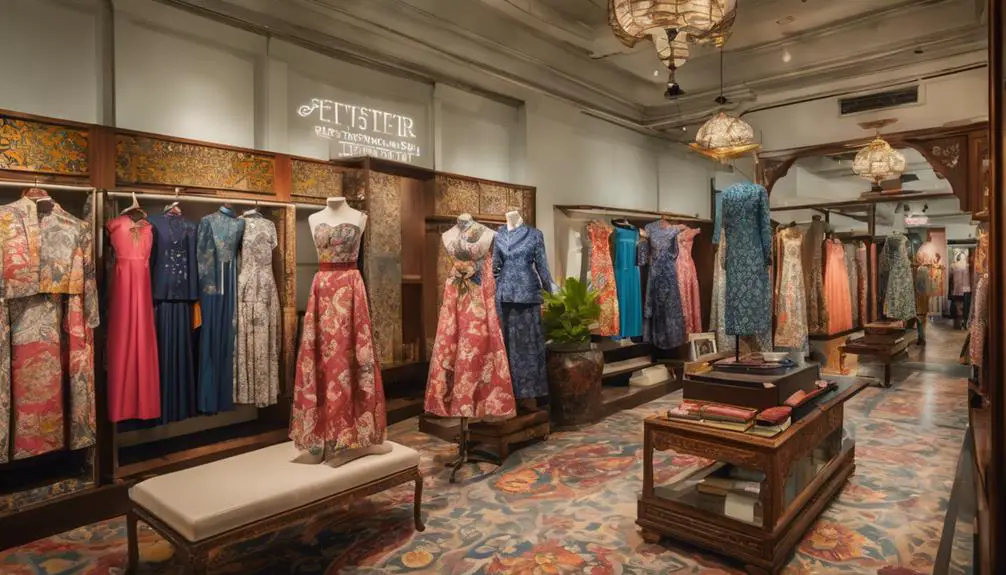
How have Singapore's oldest fashion brands influenced the local culture? They've woven a rich tapestry of tradition and modernity that reflects the city-state's unique identity.
Take CYC, for instance. Founded in 1935, it introduced bespoke tailoring to Singapore, emphasizing craftsmanship and quality that appealed to discerning customers. This evolution in custom clothing set the stage for a vibrant tailoring culture that you can still see today.
Then there's Old Chang Kee, which began in 1956. This brand revolutionized local culinary fashion, combining traditional snack offerings with innovative branding strategies. Their curry puffs have become a staple, blending casual dining with a cultural flair.
Similarly, Ya Kun Kaya Toast, established in 1944, showcases how food and fashion intertwine in Singapore's heritage, serving not just breakfast but a slice of history.
Traditional clothing brands focusing on batik and ethnic wear also play an essential role in showcasing Singapore's cultural diversity. These garments reflect the country's rich history, allowing you to celebrate your heritage while embracing contemporary styles.
The vibrant colors and intricate designs of batik not only tell stories but also foster a sense of belonging among the various communities.
In essence, these oldest fashion brands have greatly shaped Singapore's cultural landscape, merging traditional elements with modern practices. This blend of bespoke tailoring, culinary fashion, and traditional clothing truly encapsulates the spirit of a nation that honors its past while looking forward to the future.
Pioneering Brands in Singapore
Singapore's vibrant fashion landscape wouldn't be what it's today without its pioneering brands that have shaped both the industry and local culture. These Singaporean fashion brands have greatly contributed to the development of the fashion industry, showcasing the talent of local designers who create elegant pieces and innovative clothing lines.
One standout is CYC The Custom Shop, established in 1935, which specializes in bespoke suits that combine traditional tailoring with modern silhouettes, reflecting a rich heritage while meeting contemporary demands.
Another remarkable brand is BreadTalk, which revolutionized the bakery scene with thoughtfully designed pastries that incorporate fashion-forward concepts, proving that culinary creativity and style can go hand in hand. This innovative approach has inspired other Singaporean fashion brands to think outside the box, blending fashion with everyday life.
Ya Kun Kaya Toast is also a prime example of how local heritage can inspire modern branding. Its success in providing traditional breakfast offerings demonstrates how cultural elements can be integrated into a clothing line, appealing to both locals and tourists alike.
Each of these brands embodies a unique aspect of Singapore's identity, fusing tradition with innovation.
As you explore Singapore's fashion scene, you'll find that these pioneering brands not only highlight the creativity of local designers but also set the stage for future generations to thrive in an ever-evolving industry.
This dynamic interplay of heritage and modernity keeps Singapore's fashion narrative fresh and exciting, paving the way for even more remarkable developments in the years to come.
Evolution of Brand Identity
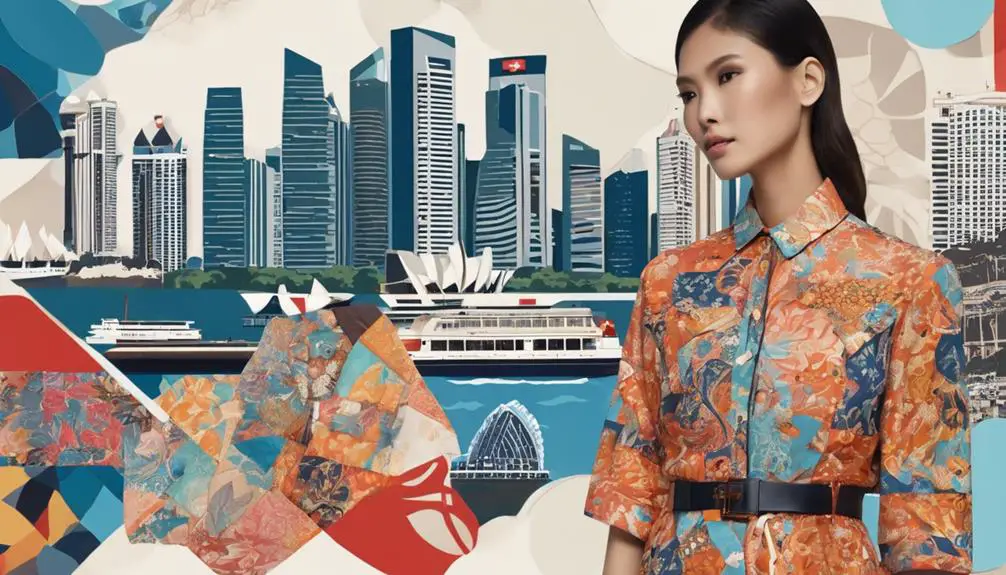
What drives the evolution of brand identity in Singapore's fashion scene? As you explore the journey of local fashion brands, you'll notice how they adapt to the ever-changing tastes and preferences of consumers.
Take CYC The Custom Shop, for example. Established in 1935, this brand has since shifted from traditional Chinese garments to specializing in custom clothing, reflecting the modern demands for personalization and style. Similarly, local fashion designers are embracing minimalism and reinterpreting classic pieces to create clothing designs that resonate with everyday wear.
The evolution of brand identity in Singapore isn't just about clothing; it's also about storytelling. Brands like Old Chang Kee and Ya Kun Kaya Toast have successfully integrated local heritage into their identities, showcasing a deep connection to Singapore's culture. Their approach emphasizes not only the products they offer but also the values and narratives behind them, which enrich the consumer experience.
As fashion evolves, so does the need for brands to remain relevant. This is where innovation comes into play. Brands must continually assess their identity and adapt to align with contemporary trends while staying true to their roots.
The local fashion scene thrives on this dynamic interplay of tradition and modernity, allowing brands to carve unique identities that captivate consumers. Through creative designs and a commitment to authenticity, Singapore's fashion brands aren't just keeping up; they're leading the charge in a vibrant and ever-evolving landscape.
Cultural Influence on Fashion
Embracing cultural diversity greatly shapes the fashion landscape in Singapore. From the early 1900s to the 1950s, traditional ethnic attire like the baju kurong, sari, kebaya, and cheongsam dominated the scene, beautifully reflecting the rich tapestry of Singapore's population.
As Western attire made its entrance in the late 1960s, designers began fusing these traditional designs with contemporary styles, showcasing the powerful cultural influence that continues today.
Fast forward to the 1980s, when power dressing emerged in response to women's increasing roles in the workforce. This shift prompted designers to adapt styles that empowered women, mirroring their aspirations and ambitions.
Today, local clothing brands such as Ong Shunmugam are at the forefront of modernizing ethnic designs, ensuring that cultural significance remains intact while meeting contemporary tastes.
The vibrant local fashion scene is a treasure trove of cultural influences, with emerging designers leading the charge. They're not just creating clothing; they're weaving stories that reflect Singapore's identity.
Many of these designers emphasize sustainable practices and slow fashion, promoting a mindful approach to consumption. Events like Singapore Fashion Week serve as a platform for showcasing this unique blend of tradition and modernity, celebrating local talent and their innovative visions.
In this dynamic environment, Singapore's fashion is a beautiful dialogue between past and present, where cultural influences continue to inspire and shape the future of fashion.
Legacy of Craftsmanship
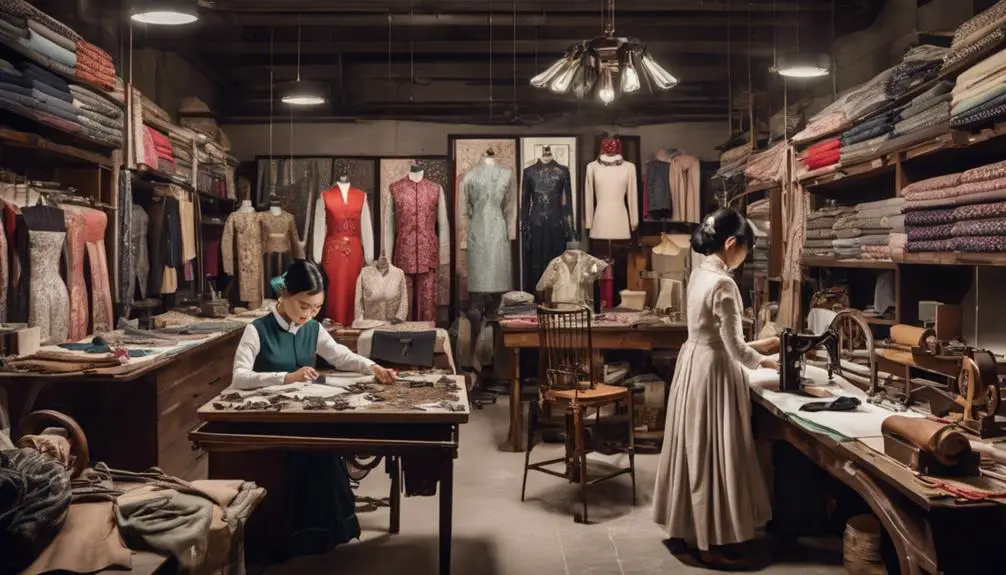
When you think about the legacy of craftsmanship in Singapore's fashion scene, timeless design principles and master tailoring techniques immediately come to mind.
Brands like CYC The Custom Shop showcase how bespoke tailoring not only reflects individual style but also honors the rich tradition of craftsmanship passed down through generations.
Timeless Design Principles
In the domain of fashion, the legacy of craftsmanship stands out as a beacon of timeless design principles. Brands like CYC The Custom Shop and Benjamin Barker highlight how bespoke tailoring can create personalized garments that resonate with individual style while honoring traditional skills.
Established in 1935, CYC exemplifies this legacy, using time-honored techniques to guarantee each piece fits perfectly and reflects the wearer's identity. Meanwhile, Benjamin Barker, founded in 2009, marries classic menswear with modern aesthetics, offering tailored pieces that maintain the integrity of craftsmanship, appealing to today's fashion-forward individual.
These brands not only focus on impeccable craftsmanship but also embrace sustainable practices, guaranteeing their creations are eco-friendly and align with contemporary values. They remind us that timeless design principles aren't just about aesthetics; they're about creating lasting value.
The enduring popularity of CYC and Benjamin Barker underscores the significance of heritage in Singapore's fashion scene, preserving the artistry of garment making while innovating for future generations. By prioritizing craftsmanship, these brands inspire a deeper appreciation for the art of fashion, showcasing how traditional skills can thrive in a modern context.
Master Tailoring Techniques
Master tailoring techniques have long been the backbone of Singapore's fashion heritage, showcasing a blend of precision and artistry that defines the bespoke experience. Brands like CYC The Custom Shop, which has specialized in bespoke clothing since 1945, exemplify the dedication to craftsmanship that characterizes this industry.
You'll find that these traditional methods emphasize precision and the use of high-quality fabrics, resulting in personalized fits that cater to your unique preferences.
The art of tailoring in Singapore is enriched by cultural influences, seamlessly integrating techniques from both Western and Asian styles. This fusion not only reflects the country's diverse heritage but also enhances the creativity behind tailored menswear.
Master tailors invest years in apprenticeship, honing their skills in cutting, stitching, and finishing garments, ensuring excellence in every stitch.
Even modern brands like Benjamin Barker, established in 2011, pay homage to this legacy by combining contemporary aesthetics with time-honored techniques to create timeless pieces.
Modern Adaptations and Trends
Singapore's oldest fashion brands are skillfully maneuvering the modern landscape by embracing contemporary trends and consumer demands.
These old brands, like CYC The Custom Shop and Old Chang Kee, have successfully modernized their offerings, incorporating online tailoring services that cater to today's tech-savvy shoppers.
In a world where sustainability is paramount, brands such as BreadTalk are stepping up by adopting eco-friendly practices and sourcing materials responsibly, aligning with the growing demand for ethical fashion.
Traditional designs are experiencing a renaissance, as seen with Ong Shunmugam, which breathes new life into ethnic attire like the cheongsam.
By modernizing such garments, they resonate with today's fashion sensibilities while honoring their cultural heritage.
Meanwhile, the rise of casual wear has prompted brands like Ya Kun Kaya Toast to diversify their product lines, ensuring that comfort and versatility become integral to everyday fashion.
These established brands are also collaborating with contemporary designers and local artisans, showcasing a delightful blend of heritage and modern aesthetics.
This fusion not only refreshes their collections but also engages a younger audience enthusiastic for innovative styles.
As you explore these adaptations, you'll find that Singapore's fashion scene isn't just about clothes; it's a vibrant tapestry that weaves together tradition and modernity.
Frequently Asked Questions
Which Fashion Brand Is the Oldest?
If you're exploring heritage fashion, look for brands that showcase timeless style and cultural influences. Vintage boutiques often highlight traditional textiles, while iconic designers embrace local craftsmanship, reflecting fashion evolution and historical significance in their creations.
Which Brand Is Famous in Singapore?
In Singapore's vibrant tapestry of style, local designers weave street style and luxury boutiques together. With cultural influences, sustainable fashion, and thriving fashion events, online shopping and textile heritage shine brightly in this dynamic fashion landscape.
How Were People in Singapore Dressed in the Past?
In the past, you'd see people in Singapore donning traditional attire like baju kurong and cheongsam, influenced by cultural heritage. Colonial fashion mixed with local textiles, shaping street style and reflecting the fashion evolution of the era.
Is Singapore a Fashion Hub?
You might think Singapore's just a stopover, but it's a vibrant fashion hub. Local designers showcase cultural influences through street style, sustainable fashion, and education, while fashion events highlight its evolution and global trends in the textile industry.
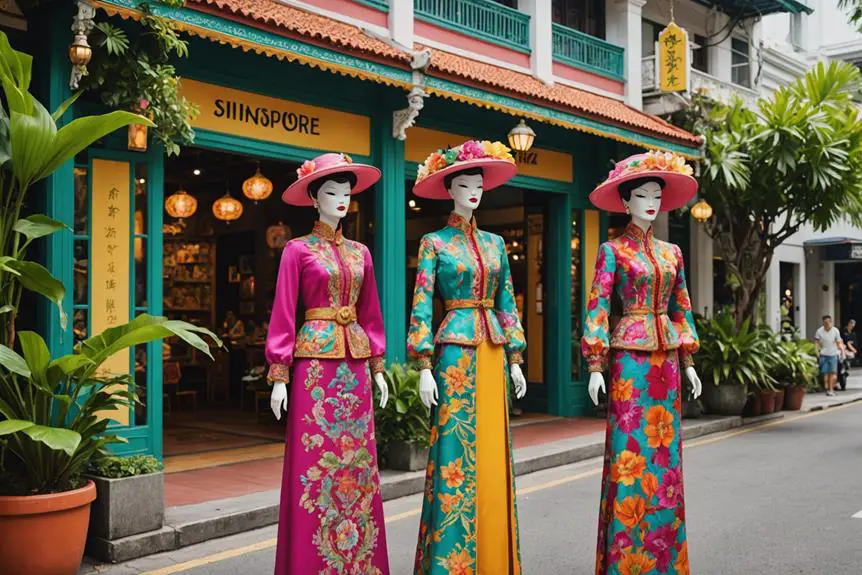

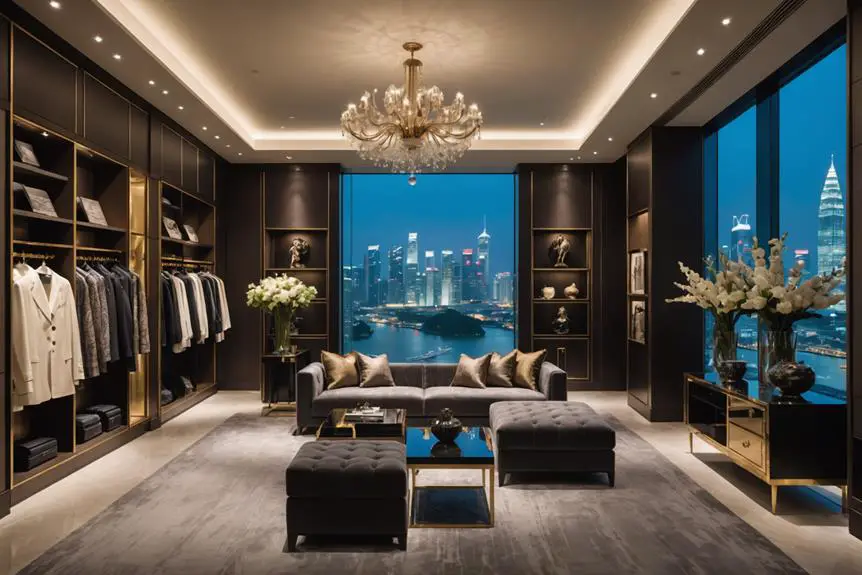

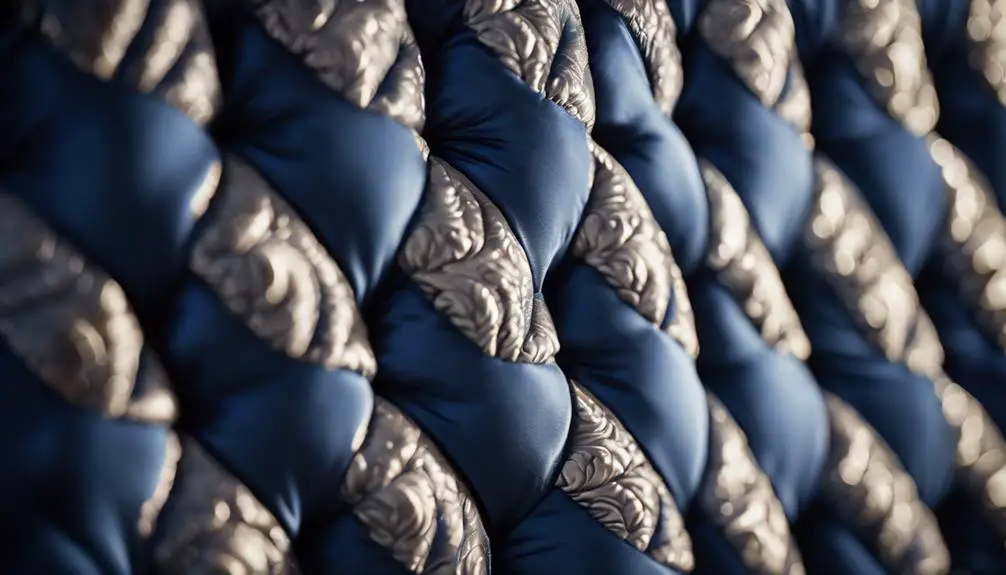
One Comment